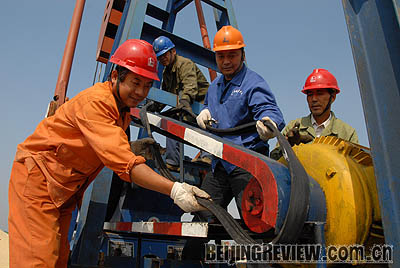|

TOUGH TIMES: Sinopec, China's largest oil refiner, is struggling to make a profit due to the price gap between world crude oil and oil products Photo by HU QINGMING
A 65-percent plunge in first-quarter profits, that's the fallout after China Petroleum and Chemical Corp. (Sinopec), Asia's largest refiner, posted huge losses from its principal refining operations.
Sinopec reported on April 28 that its profit for the first quarter ending March 31 was 6.7 billion yuan ($957 million), almost a third down on comparative figures for last year of 19.42 billion yuan ($2.77 billion). Its earning per share in the first quarter was 0.077 yuan ($0.011), far below the 0.224 yuan ($0.032) for the same period in 2007.
Sinopec's stock prices dropped 4.38 percent and 2.66 percent, respectively on the A share market and the Hong Kong market after Sinopec announced its first quarter results on April 28.
As world crude oil prices and inflation in China spiked to new highs, the Central Government has forged a series of polices to subsidize oil refiners which are suffering massive losses in processing.
The reason major oil refiners, including Sinopec and PetroChina, are taking these big hits is that they are not permitted to raise prices when importing expensive crude oil. Sinopec received a state subsidy of 12.3 billion yuan ($1.76 billion) at the end of 2007, of which 7.4 billion yuan ($1.06 billion) was booked to cover its refining loss in the first quarter. But for the state subsidy, the company's real losses in the first quarter was 700 million yuan ($100 million).
The company estimated, as a precaution on April 18, that its profit for the first quarter would dive more than 50 percent despite its profit during the same period last year soaring by 112 percent. Sinopec's explanation for this contrast was that the huge losses in its principal refining division had affected the company's overall performance.
According to the quarterly report, despite a decline in net profit, Sinopec reaped a total revenue of 332 billion yuan ($47.4 billion), up 20 percent year on year, thanks to growths in exploration, refining and processing, oil sales and distribution, and chemical operations.
The major reason, Li Guohong, an analyst with Beijing-based Galaxy Securities, told Beijing Review, was the world crude oil price hikes that had handicapped Sinopec's profitability.
The rapid growth of China's economy has put great demands on energy and resources. As a result, China has become increasingly dependent on imported crude oil and is the world's third largest crude oil importer at present. According to the General Administration of Customs (GAC), China imported 159.28 million tons of crude oil last year, up 14.7 percent year on year, and this accounted for 46.05 percent of the total oil consumption last year in China. China's dependence on imported oil may reach 60 percent by 2020, predicts the GAC.
Sinopec as China's largest refiner also relies on large quantities of imported crude oil. The company currently refines about 70 percent of the crude oil for the domestic market and 70 percent of the crude oil it refines is imported. As a result, the refiners in China felt great pressure from global crude price hikes when they spiked to new peaks and approached $120 per barrel in April.
Despite the constant price spikes, the Chinese Government controls the prices of oil products in the domestic market. Refineries cannot increase the prices of oil products to transfer increased costs to their customers. The prices of oil products have been stable since the National Development and Reform Commission adjusted the prices on November 1, 2007. The producer prices for oil products in China are much lower than the world crude oil price. For example, the gas price is $117 per barrel and the diesel price is $108 per barrel.
"Sinopec suffers a loss of 1,000-1,500 yuan ($143-214) for each ton of oil products sold if taking into consideration of import-entailed expenses and processing costs," said Li.
In order to ease pressures on these oil refiners, the Ministry of Finance announced it would return value-added tax levied on 3.5 million tons of oil products Sinopec and PetroChina would import in the second quarter, which include a quota of 500,000 tons of gas and 1.5 million tons of diesel for Sinopec. This tax return policy will return 2.51 billion yuan ($358.6 million) to Sinopec.
Furthermore, the Central Government has offered state subsidies to refiners to offset their losses from processing imported crude oil as of April 1.
Dong Xiucheng, Vice Dean of the School of Business and Management at the China University of Petroleum, interpreted the move as measures to stabilize consumer prices, encourage imports and guarantee the supply of oil products in the domestic market with the support of state finance.
"These polices could only temporally ease operation difficulties of the two major refiners and reduce their losses," said Dong in a report by the China Times newspaper on April 18. "But they cannot work as solutions to the problem of price gaps between crude oil and oil products.
"It indicates that the government will not accept the request by refineries to increase oil product prices in accordance with world crude oil price hikes in the short term," he said. | 